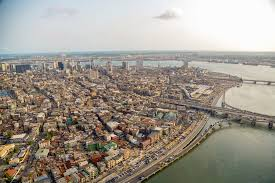I'm hoping Sanusi can tell me which will win out.
我希望薩努西能告訴我誰會贏。
The emir has a degree in Sharia, Islamic law. He also has a master's in economics. Before becoming emir, he was head of the Nigerian equivalent of the Federal Reserve. His reform agenda was so aggressive it was known as the Sanusi tsunami. It earned him recognition as the top central banker in the world. He has an equally ambitious agenda for his emirate. I listen as he describes a future that has stronger rights for women and children; he also explains how to use education and child support laws to end child marriage and slow population growth. He talks about modernizing agriculture and investing in its value chain.
埃米爾擁有伊斯蘭教法學位。他還擁有經濟學碩士學位。在成為埃米爾之前,他是尼日利亞版的美聯儲主席。他的改革議程非常激進,被稱為“佐努西海嘯”。這為他贏得了世界頂級央行行長的贊譽。他對他的酋長國有一個同樣雄心勃勃的議程。我聽過他描述一個為婦女和兒童爭取更大權利的未來;他還解釋了如何利用教育和兒童撫養法律來結束童婚和減緩人口增長。他談到了農業現代化和對其價值鏈的投資。

Can it happen?
它能發生什么呢?
State of the State
國家狀態
When you're standing on a dusty street ankle-deep in trash, watching young men load a cart with 5-gallon jugs of water that they will sell door to door to homes that lack indoor plumbing, it's not easy to envision Nigeria as a superpower. Expectations for the country have been high before: just after independence in 1960 and during the Africa Rising enthusiasm of a decade ago.
當你站在積滿灰塵、深及腳踝的街道上,看著年輕人用一輛手推車裝上5加侖的水罐,挨家挨戶地把水賣給沒有室內管道的家庭時,你很難想象尼日利亞會成為一個超級大國。在此之前,人們對這個國家的期望一直很高:1960年剛獨立不久,十年前非洲熱情高漲。
And yet, despite having had so much going for it, Nigeria has remained stuck near the bottom of the indexes used to compare nations—social progress, human development, peacefulness, governance, innovation, fragility, corruption and ease of doing business—while Asian nations have taken off. Nigeria is not a failed state, but neither is it a successful one. Oge Onubogu, who leads the Africa programs at the U.S. Institute of Peace, says, "Nigeria lurches from one crisis to another, but whenever you think it's about to topple over, it pulls itself back."
然而,盡管有如此多的有利條件,尼日利亞仍然停留在用來比較國家——社會進步、人類發展、和平、治理、創新、脆弱、腐敗和經商便利——指數的底部,而亞洲國家已經起飛。尼日利亞不是一個失敗的國家,但也不是一個成功的國家。美國和平研究所非洲項目負責人Oge Onubogu說:“尼日利亞從一個危機蹣跚走向另一個危機,但每當你認為它即將倒下時,它就會把自己拉回來。”
It's in one of those crises at the moment. Yemi Koyejo of the Nigerian-American Multicultural Council in Houston says that all Nigerians want is "a decent life." She says this comes down to basic services. "It's really bad right now in Lagos, and if it's bad in Lagos, imagine what it's like in the rest of the country. The average person wants shelter, security, health care and electricity."
目前它正處于這樣的危機之中。休斯敦的尼日利亞-美國多元文化委員會的Yemi Koyejo說,所有尼日利亞人想要的是“體面的生活”。她說,這歸根結底是基本的服務。“現在拉各斯真的很糟糕,如果拉各斯真的很糟糕,想象一下這個國家其他地方的情況。普通人需要住房、安全、醫療和電力。”
Meanwhile, the population is exploding, growing more than twice as fast as the world average. That is especially true in the North, where fertility rates are typically around seven children per woman. Except in Lagos, local governments struggle to collect taxes and provide basic services. "Middle class" is defined as the ability to afford bottled water and a generator. Even more worrying to most Nigerians is the security situation. On average, seven middle-class Nigerians and oil field workers are kidnapped and held for ransom every day. Only a few years ago, most people made the short trip from the capital Abuja to Kaduna by road.
與此同時,中國的人口正在爆炸式增長,增速是世界平均水平的兩倍多。在北方尤其如此,那里的生育率一般在每個婦女七個孩子左右。除了拉各斯,地方政府還在努力收稅和提供基本服務。“中產階級”被定義為有能力購買瓶裝水和發電機。大多數尼日利亞人更擔心的是安全局勢。平均每天有7名尼日利亞中產階級和油田工人遭到綁架和勒索。就在幾年前,大多數人還只是從首都阿布賈到卡杜納的短途旅行。
譯文由可可原創,僅供學習交流使用,未經許可請勿轉載。












